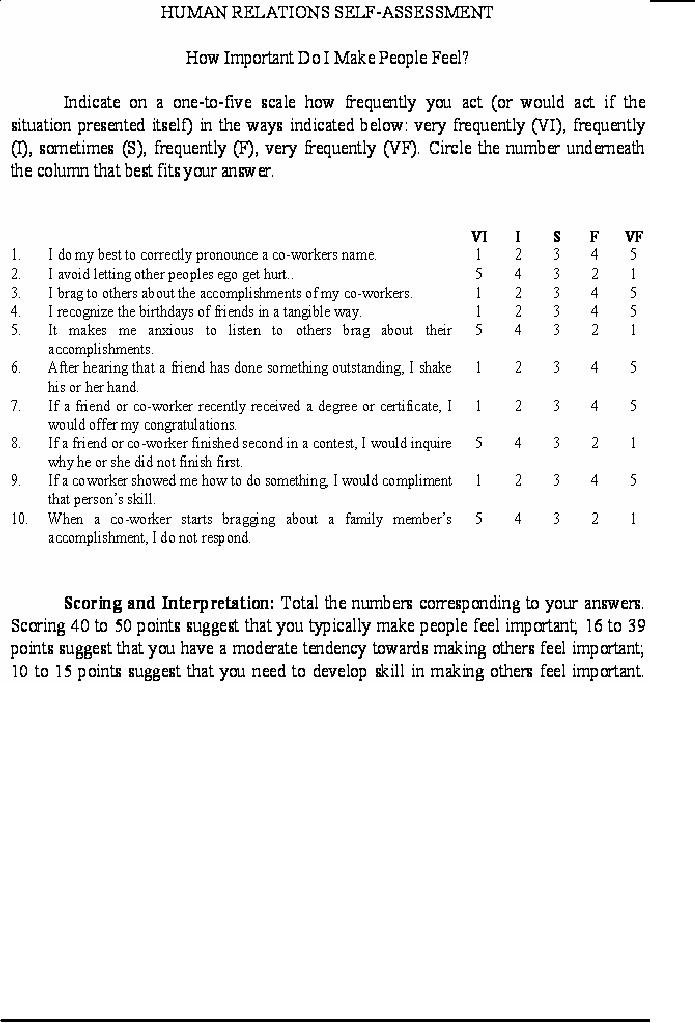 |

Human
Relations MGMT611
VU
Lesson
22
BUILDING
GOOD RELATIONS WITH
CO-WORKERS
Quotations
People
will perform their potential
only when they know almost
everyone around them.
Ricardo
Semler (Brazilian
business executive)
The
only irreplaceable capital an
organization possesses is the knowledge and
ability of its people.
The
productivity
of that capital depends on
how effectively people share
their competence with those
who can
use
it.
Andrew
Carnegie (1835
- 1919) Scottish-born U.S. industrialist
and philanthropist.
Building
Good Relations with
Co-workers
In
this lesson we will learn the importance
of healthy relationships with the co-workers
and colleagues. We
shall
learn the techniques of building good,
productive and congenial
relationships. Developing
good
synergetic
relationships for personal and
organizational success will be focused
here. If we are unable
to
work
cooperatively with others, it will be
difficult to hold on to our
job. We need their cooperation
and they
need
ours.
A.
Develop
Allies through Being Civil
Be
polite, be kind, be candid
and sincere with your
co-workers. People who are
courteous, kind,
cooperative,
and cheerful develop allies and friends
in the workplace. Being civil
helps make you stand
out
because
many people believe that
crude, rude, and obnoxious
behaviour has become a
national problem.
Closely
related to being civil is to maintain a
positive outlook.
B.
Make
Co-workers feel
important
Another
thing that plays an
important role in bringing people
closer is to make them feel important.
Giving
importance
by acknowledging their work helps
building good relations.
Therefore acknowledge
accomplishments
and good things of
others.
Let
us try to measure whether we have the
skill to make people feel important
through a quiz.
67

Human
Relations MGMT611
VU
Source:
DuBrin,
Andrew J. `Human Relations: Career
and Personal Success',
Pearson Prentice Hall,
2005.
C.
Maintain
Honest and Open Relationships
Honest
and trustworthy relationship may be very
helpful for building good
relationships. Giving
co-workers
frank,
but tactful, answers to
their requests for your
opinion is one useful way of
developing open
relationships.
Accurately expressing your feelings
also leads to constructive
relationships.
D.
Be
a Team Player
When
you are working with people
then show team spirit. An
essential strategy for
cultivating peers is to
function
as a team player by such
means as:
1.
Share credit with
co-workers.
2.
Display a helpful, cooperative attitude.
3.
To establish trust, keep confidential
information private and give
honest opinions.
4.
Share information and
opinions with
co-workers.
5.
Provide emotional support to
co-workers.
6.
Follow the golden rule (It means
try to treat others the way
you like to be treated by
others)
7.
Avoid actions that could
sabotage or undermine the group in any
way.
68

Human
Relations MGMT611
VU
8.
Attend company-sponsored social
events.
9.
Share the glory.
E.
Avoid
backstabbing
A
special category of disliked behaviour is
backstabbing,
an attempt to
discredit another person by
underhanded
means such as innuendo,
accusation, or the like.
F.
Follow
Groups Standards of Conduct
To
be a good co-worker, one has
to adhere to group
norms, the
unwritten set of expectations
for group
members--what
people ought to do. Yet
conforming too closely to
group norms leads to a loss
of
individuality.
Norms are a major part of the
organizational
culture, or
values and beliefs of the
firm that
guide
people's actions.
Group
norms also influence the social
aspects of behaviour on the
job.
G.
Express
an Interest in the Work and
Personal Life of
Others
Almost
everyone is self-centered to some extent.
Expressing an interest in the work
and personal lives of
others
can therefore help build
good co-worker relationships.
H.
Use
Appropriate Compliments
Compliments
should be genuine; they should not be
taken as flattery. Compliments can be a
very good
relationship
builder but they should be appropriate to the
good deed. A compliment is a form of
positive
reinforcement,
rewarding
somebody for doing something
right. Appropriate compliments
will be
perceived
as sincere. Exaggerated compliments
will be perceived as insincere.
Another good method of
cultivating
co-workers is to give them recognition
for their
accomplishments.
I.
Deal
Effectively with Difficult
People
The
people whose behaviour is offensive or
whose tactics are unethical or obtrusive,
undermine the
relationships
and the motivation of the people for
work and achieve their
goals. A major challenge in
getting
along well with co-workers is to
deal constructively with difficult
people. A co-worker is classified
as
difficult
if he or she is uncooperative, touchy,
defensive, or very unfriendly. The
following tactics are
designed
to deal with difficult
people:
1.
Take Problems Professionally, Not
Personally
A
key principle in dealing
with a variety of personalities is to
take what they do professionally,
not
personally.
To a difficult person, you
might just represent a
stepping-stone to getting what they want.
2.
Give Ample
Feedback
The
primary technique for dealing
with counterproductive behaviour is to
give feed back to the
difficult
person
how his/her behaviour
affects you.
3.
Listen and Respond
Give
the difficult person ample
opportunity to express his/her
concerns, doubts, anger, or other
feelings.
Then
acknowledge your awareness of the
person's position.
4.
Use Tact and Diplomacy in
Dealing with Annoying
Behaviour
Tactful
actions on your part can
some times take care of
annoyances without having to confront
the
problem.
An example would be closing the
door to deal with noisy
co-workers.
5.
Use Humour
Non-hostile
humour can often be used to
help a difficult person
understand how his or her
behaviour is
blocking
others. Also, the humour
will help defuse conflict
between you and that
person.
6.
Avoid Creating a Dependency on
You
A
trap to avoid with many
difficult people, and especially the
high-maintenance person, is to let
him/her
become
too dependent on you for
solutions to problems.
7.
Reinforce Civil Behaviour and Good
Moods.
When
a generally difficult person is behaving
acceptably, recognize the behaviour in
some way. Reinforcing
statements
would include, "It's fun
working with you
today."
69

Human
Relations MGMT611
VU
8.
Face Maturely the Challenge
of the Office Relationships
Strive
to keep the personal relationships
confidential and restricted to after
hours. Use good judgment
and
be
discreet.
References:
Dubrin,
A.J. (2005). Human Relations:
Career and Personal Success.
Upper Saddle River, New
Jersey,
07458.
70
Table of Contents:
- HUMAN RELATIONS:Some Guidelines for Effective Human Relations, Communication has 3meanings
- CULTURE AND PERSONALITY:Definition of sub culture, Definition of Personality, Types of Persons
- PERSONALITY AND STRESS:Personality, PERSONAL TOOLS TO CONTROL STRESS
- PERCEPTION AND INDIVIDUAL BEHAVIOUR:Three concepts of personality, Bias in Perception
- PERCEPTION AND GROUP BEHAVIOR:Characteristics of Groups, Individual and Group Behavior
- ATTITUDE AND BEHAVIOUR:Types of Attitudes, Steps to turn attitude into action
- PERSONAL MOTIVATION AND ACHIEVEMENT:Needs and Motivation, Self-discipline and motivation
- SOLVING PROBLEMS SKILLFULLY:Problem solving and cognition, Ways to solve problems
- CREATIVITY IN PROBLEM SOLVING:Barriers to creativity, Tips to solve problems creatively
- HANDLING PERSONAL ISSUES:Self-Defeating Behaviour, Positive attitude to tackle personal problems
- CONFLICT RESOLUTION:WHY SO MUCH CONFLICT EXISTS, TECHNIQUES FOR RESOLVING CONFLICTS
- COMMUNICATION AND HUMAN RELATIONS:Process of communication, Improving gender barriers to communication
- ORGANIZATIONAL COMMUNICATION:To improve listening skills, Types of organizational communication
- UNDERSTANDING COMMUNICATION STYLES:Modeling communication style, Sociability continuum
- SELF-ESTEEM:Building process of self-esteem, Self-esteem and public image
- BUILDING SELF-CONFIDENCE:The importance of self-confidence and self-efficacy, Balanced Self-Confidence:
- BECOMING A LEADER-1:Assessing leadership role, Traits and Characteristics of Effective Leaders
- BECOMING A LEADER-II:Theories of leadership, Developing leadership potential
- GLOBALIZATION AND CROSS-CULTURAL DIFFERENCES:Religious Values and Bicultural Identities
- IMPROVING CROSS-CULTURAL COMPETENCE:Strategies to improve cross-cultural relations, More steps to improve Cultural Relations
- BUILDING GOOD RELATIONS WITH MANAGERS:Impressing your manager, Coping with a problem manager
- BUILDING GOOD RELATIONS WITH CO-WORKERS:Make Co-workers feel important, Maintain Honest and Open Relationships
- BUILDING GOOD RELATIONS WITH CUSTOMERS:Salesperson Represents the Business, Approaching the Customer, Excuses vs. Objections
- CHOOSING A CAREER-1:Ten Myths about Choosing a Career, Attitude toward and Perceptions about Myself
- CHOOSING A CAREER-II:Choosing a career and developing a portfolio Career, Suggestions for career Preparation
- FINDING A JOB:Targeting your job search, The Internet and Résumé Database Services, Extreme Job Hunting
- SIGNIFICANCE OF RESUME:Major types of resumes, Electronic Submission of the Résumé
- IMPROVING INTERVIEW SKILLS:Successful interview, Knowing the employer or Organization
- IMPROVING WORK HABITS-1:Reasons of procrastination, Techniques for Reducing Procrastination
- IMPROVING WORK HABITS-2:Developing the proper attitudes and values, Time-management techniques
- NEW MODEL OF CAREER ADVANCEMENT:Career portability, HUMAN RELATIONS SELF-ASSESSMENT
- TAKING CONTROL OF YOURSELF:Develop Outstanding Interpersonal Skills, Business etiquettes
- EXERTING CONTROL ON OUTSIDE ENVIRONMENT:Important communication tip, Exerting control over the outside world
- MANAGING PERSONAL FINANCES-1:Your personal financial plan, Steps in budget making
- MANAGING PERSONAL FINANCES-2:Basic investment principles, Tolerance for Investment Risks, Types of investments
- ACHIEVING HAPPINESS-1:Finding happiness and enhancing your personal life, The key to happiness
- ACHIEVING HAPPINESS-2:The Five Principles of Psychological Functioning, Your mind and Happiness
- ACHIEVING HAPPINESS-3:Need for intimacy, Working out issues with relationships
- APATHY AND ITS REMEDIES:Let us try to understand the various definitions of apathy, Coping strategies for apathy
- ENHANCING PERSONAL ETHICS-1:Influence of Culture, Common ethical problems
- ENHANCING PERSONAL ETHICS-2:Common ethical problems, Guidelines for Behaving Ethically
- HELPING OTHERS GROW:Being a Nurturing, Positive Person, A list of mentoring behaviour, Coaching skills and techniques
- REVIEW-I:What is a Human Relation?, Meanings of Communication, Two types of stress, Some personal problem, Communication style
- REVIEW-II:Steps to build self-confidence, Globalization, Building Good Relations with Co-workers, Good work habits
- REVIEW-III:New model of career advancement, Choosing your investment, Tactics for Dealing with Difficult People